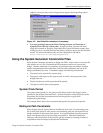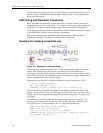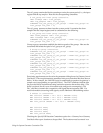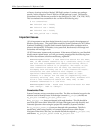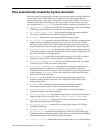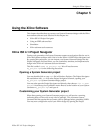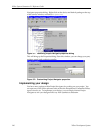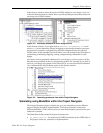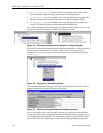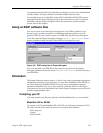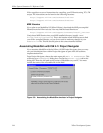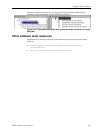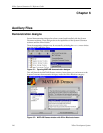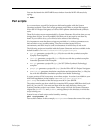
Perl scripts 147
Auxiliary Files
You can also launch the MATLAB Demos window from the MATLAB console by
typing:
>> demo
Perl scripts
As a convenience, several Perl scripts are delivered together with the System
Generator software. These Perl scripts generate project files or scripts that support
Xilinx ISE 4.1i Project Navigator, as well as Xilinx partner simulation and synthesis
tools.
These Perl scripts are run automatically by System Generator. We advise that you not
change these scripts. You will probably find that you do not need to run them by
hand. If you wish to do so, you will need to be aware of the following:
It is important to note that these scripts are provided as-is, with no guarantees as to
their results in every possible setting. They have not been tested in every
environment, and there may be some circumstances in which they do not work.
The following scripts are installed with the System Generator and are available in the
default location $MATLAB/toolbox/xilinx/sysgen/scripts:
• syn.pl: generates a project file (.prj file) for use with the synthesis compiler
Synplify from Synplicity
• leon.pl: generates a project file (.tcl file) for use with the synthesis compiler
Leonardo Spectrum from Exemplar
• xst.pl: generates a project file (.prj) for XST (Xilinx Synthesis Technology)
compiler
• pnnpl.pl: generates a project file (.npl) for the Xilinx ISE 4.1i Project Navigator
• pnmtido.pl: generates simulation compilation and simulation files (.do files) for
use with the ModelSim simulation product from Model Technology
A recent version of Perl is necessary to run these scripts. A version is available in your
MATLAB installation (in the location $MATLAB/sys/perl/win32/bin/
perl.exe). The location of the Perl script must be in your $PATH.
The scripts must be run from a shell (for example a DOS prompt, MKS Korn shell, tcsh
shell, etc.) on your PC. You must run them from the same directory where your
System Generator project was written. These scripts will look for System Generator
output files (vhdlFiles and globals, among others) in the directory in which the
script is being run.
Syntax for use of each script can be found by running
perl <scriptname> -h
from a shell window. In this example, <scriptname> denotes the name of the script.



